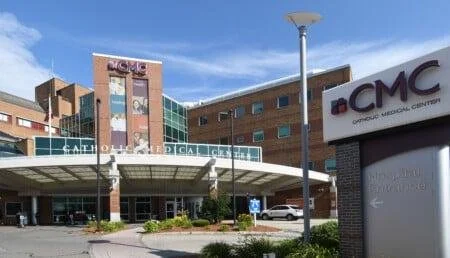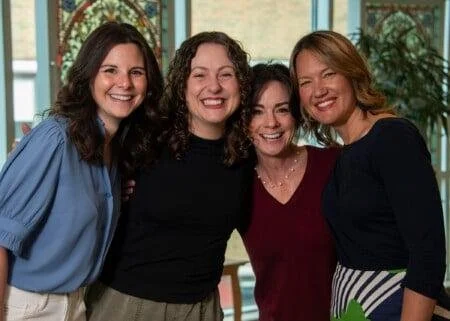Editor’s note: This story is part of Critical Condition, a special series co-produced by the Granite State News Collaborative and its local news partners (including NH Business Review). Together, we’re exploring how hospital consolidation is reshaping health care in New Hampshire — impacting costs, access, and the future of care in our communities.
By Krysten Godfrey Maddocks, NH Business Review
In February, Hospital Corporation of America, the largest for-profit hospital system in the U.S., completed its acquisition of Catholic Medical Center in Manchester for $110 million.
State lawmakers and health care providers are trying to anticipate how this shift in ownership will affect access to health care for patients in the Queen City area and competition in the southern part of the state.
Now that CMC is no longer a nonprofit hospital, it will no longer be subject to the federal and state rules governing charity care and community health services or benefits. Nonprofit charitable hospitals must develop community benefit and health improvement plans to maintain their tax-exempt status, whereas for-profit hospitals are not required to continue services or add providers to meet community needs.
HCA Healthcare is considering a freestanding emergency department for Catholic Medical Center, “which has proven effective in Plaistow and Seabrook by helping to alleviate hospital ED wait times,” spokeswoman Laura Montenegro says. (Photo by Jodie Andruskevich)
With its acquisition of CMC, HCA now owns four of the 26 acute care hospitals in New Hampshire. Previous HCA hospital acquisitions could provide a blueprint of what’s to come.
Just five years ago, HCA acquired Frisbie Memorial Hospital in Rochester, which had also operated as a nonprofit hospital. In 2022, Frisbie announced it would stop offering labor and delivery, moving those services to HCA-owned Portsmouth Regional Hospital — becoming the 11th hospital in the state to stop offering birthing services since 2000.
HCA-owned Parkland Medical Center in Derry ceased its labor and delivery services in 2020.
Under HCA management, CMC will provide labor and delivery.
On average, CMC providers deliver about 1,000 births each year. Beginning July 3, Dr. Thomas Zarka, an OB-GYN at Women’s Health Associates of Derry, and his partner, Dr. Robyn Stewart, began delivering babies at CMC.
This comes at a critical time, as Dartmouth Health had announced in fall 2024 that it would be pulling its labor and delivery team from CMC on June 30, 2025. Zarka, who has been in practice for 18 years, and Stewart briefly worked at CMC after Parkland’s labor floor closed. In addition to labor and delivery, Zarka specializes in advanced robotic laparoscopy, menopausal care and adolescent gynecology.
Both doctors have been delivering babies at St. Joseph Hospital in Nashua, and performed surgeries at Parkland. Their move to CMC this summer gives Greater Manchester patients better access to labor and delivery and allow for smoother transfers between Parkland’s Emergency Department and CMC’s Labor and Delivery Department, Zarka says.
Women’s Health Associates of Derry also plans to collaborate with New England Midwifery, comprised of six nurse midwives based at CMC, who will manage inpatient and outpatient care and provide 24/7 coverage for labor, delivery and post-partum care. The new hospital-based midwifery group will handle low-risk pregnancies, working alongside Zarka and Stewart in the labor and delivery room.
“Midwifery in general tends to be less interventional, a little more holistic, and midwives tend to stay with patients more frequently during the labor,” Zarka says. “It’s often what most women would like and choose from the get-go.”
Under CMC’s previous model, Dartmouth Health OB-GYNs worked alongside midwives and residents. Often, residents oversaw deliveries to gain experience. Zarka says that the new model at CMC will better support continuity of care and allow the midwives to do the parts of their jobs they enjoy fully.
“They’ve (CMC’s) been working more as a gatekeeper model where they essentially admit and take care of all the laboring patients that are low risk. But then the resident (often) steps in and does the delivery, which, from the midwife standpoint, that’s not what they’re trained to do,” Zarka says. “Their fun is delivering babies, so I think they’re excited for this transition.”
Ultimately, Zarka believes patients will benefit from more personalized, consistent care at CMC without the additional layer of residents and rotation-based care.
“They’re going to either have a physician or a midwife,” he says. “They’re going to have the people that they’ve been seeing all along and not (have their babies) delivered by a stranger.”
In July, Dartmouth Health relocated its labor and delivery services from CMC to Elliot Hospital’s Birth Center. This allows Dartmouth Health to expand its own OB-GYN residency program and strengthens the relationship between Dartmouth and Elliot.
The two already collaborate on general surgery, bariatric surgery and inpatient pediatric care. Currently, Elliot partners with Manchester OB/GYN Associates, Amoskeag Women’s Health, and Bedford Commons to provide women’s health and obstetrical and gynecology services.
“Our commitment is always to provide essential health care services needed by mothers and children in our region,” says Dr. Gregory Baxter, CEO and president of Elliot Hospital. “For many years, we have enjoyed the support of strong partners in obstetrics. These existing partnerships remain essential for our community.
“Now, we are pleased to add the obstetric providers from Dartmouth, building on our longstanding relationship with Dartmouth Health,” Baxter says. “We have expanded our capacity to support this new activity, which adds to The Elliot’s service, which was already the busiest in New Hampshire.”
Baxter expects that Dartmouth Health will bring four to five OBGYN physicians, four to five midwives, and two to three rotating residents to Elliot. These providers will also offer gynecology services and surgery, in addition to labor and delivery services.
CMC this spring announced specific plans to continue labor and delivery services, and more recently commented about how they plan to backfill primary care services. New Hampshire, like the rest of the country, faces a primary care provider shortage. The state is estimated to have one primary care provider for every 1,025 people.
Primary care remains a key focus in CMC’s organizational planning, spokeswoman Laura Montenegro says.
“The growth of our primary care network is driven by the needs of the communities we serve — ensuring timely, local access to the foundational care patients rely on,” she says.
CMC currently manages 11 primary care practices and one urgent care location. (Appledore Medical Group is an affiliate of HCA Healthcare.)
“We continue to recruit and expand in direct response to where care is most needed,” Montenegro says.
Elliot Hospital’s board of directors continues to focus on primary care access. According to Baxter, several CMC primary care providers have already left the area, joined other hospital systems, or have opened independent practices. Elliot Hospital continues to prioritize primary care and recruit new providers to meet the growing demand, Baxter says.
Certified nurse midwives Kelli McKay, Isabel Brewster, Kerri Hoyt, Christy Aberg work for CMC’s new hospital-based midwifery group, which will handle low-risk pregnancies, working alongside doctors in the labor and delivery room. (Courtesy of CMC)
“We’re adding sometimes 300 to 500 patients a month, which challenges us to find space, locations and providers for them,” Baxter says. “Under the leadership of Dr. Kevin Desrosiers and our other physician leaders, we’re able to recruit. It remains to be seen how primary care is going to shake out and what resources are brought to bear either by us, by other institutions or by HCA themselves.”
Currently, Elliot serves 120,000 patients and has added 20,000 patients to its primary care panel over the past four to five years. The hospital owns 18 primary care practices, of which 14 were accepting new patients as of early 2025.
Dr. Kevin Desrosiers, chief physician executive at Elliot, says that the hospital carefully monitors physician-finder activity and gaps in primary care. They will either add providers where the need is greatest or slightly expand the panels of existing providers. Although it takes months to recruit, credential and onboard new providers, Desrosiers says it “tends to be something that’s within the tolerance of the community to gain access to a primary care physician.”
The demand for health care is dynamic, and often spikes during cold and flu seasons. Leading up to the HCA transaction, CMC already had difficulty managing capacity, Desrosiers says. Elliot Hospital saw additional patients visit their emergency department during these periods and has already taken steps to manage influxes of patients — particularly for those not experiencing a true emergency.
“It obviously takes way too long to build a new brick and mortar and try to stand that up, especially if you’re not sure of the demand,” Desrosiers says.
Historically, the hospital has relied on patients to self-triage and navigate the system for themselves. However, emergency care is expensive and can come with hours-long waits to see a doctor.
“The public sees us as an access point,” Baxter says. “The challenge is that it (the ER) is not the most cost-effective way to do care, and we are on an odyssey of trying to help our community understand that,” he says.
For those experiencing ailments or injuries after hours, Elliot offers a virtual triage program, called VirtualER, to help direct patients to the right levels of care — even if they don’t have a provider affiliated with hospital system. The program launched in December 2023.
“You can register through the internet and get online with a doctor who is actually working at the Elliot, one of our emergency doctors, and they can help you understand if you actually need the emergency room, if you can wait until tomorrow to see your primary care doctor; or, if you need to go to the urgent care, we can figure out which one has the shortest wait and get you in there right away,” Desrosiers says.
Elliot’s virtual platform can also help patients get appointments for X-rays and labs before they see their doctor the next day.
So far, more than 70% of people who have accessed virtual ER services have been able to get their care completed virtually. Of the remaining 30%, most can complete care with a virtual visit along with a lab draw or radiology appointment. The remaining patients can visit the urgent care or emergency department.
“There’s only about 5% to 10%, depending on the month, who actually need to come into the ER,” Desrosiers says. “Creating virtual capacity with these tools that exist — whether it’s electronic or AI — are ways that we think we can responsibly utilize public trust dollars to enhance access and not leave that access laying around because we overbuilt.”
As outlined in the Attorney General’s report, HCA Healthcare, too, is committed to enhancing access to care in Greater Manchester, including emergency care, Montenegro says.
“One model under consideration is the freestanding emergency department, which has proven effective in Plaistow and Seabrook by helping to alleviate hospital ED (emergency department) wait times,” she says.
This story is part of Critical Condition: What hospital consolidation means for care, access, and your community, a special series co-produced by partners in the Granite State News Collaborative. These stories are being shared by media outlets across New Hampshire. We want to hear from you! Take our short survey at https://tinyurl.com/3au39uct about your healthcare experiences. For more information, visit collaborativenh.org.


